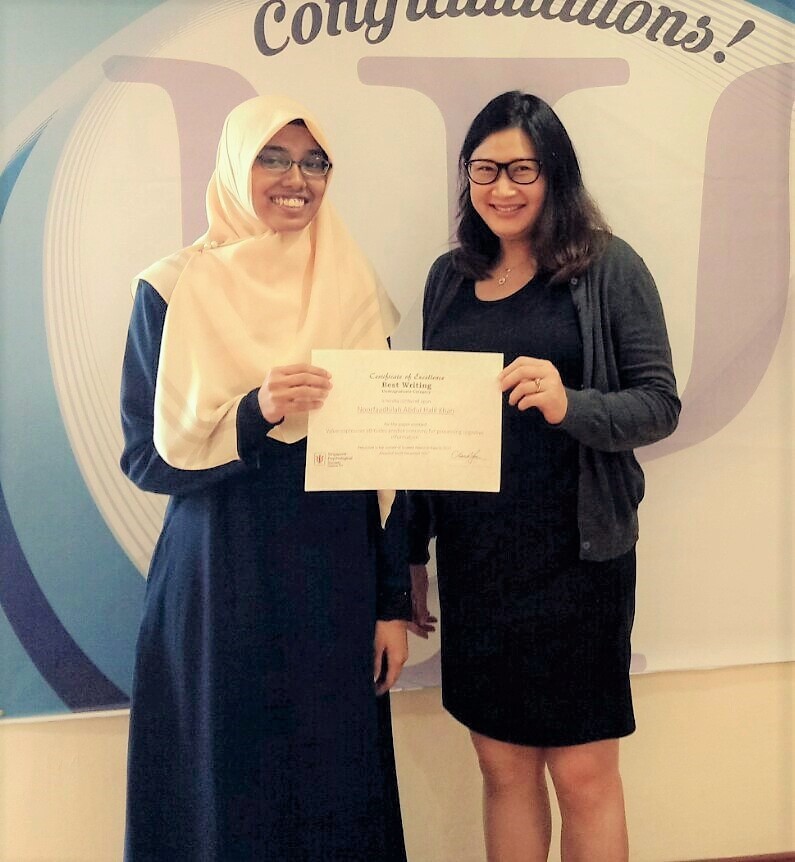We are pleased to announce that six of our graduate students have recently won the Graduate Students’ Teaching Award (GSTA) for Semester 1 AY2017/2018!
Our heartiest congratulations to all six winners, who have done our department proud!
Since Gerard, Jing Wen, Stephanie, Sukriti, and Wee Ping are first-time winners, we also took the opportunity to find out what makes them such effective teachers.
Gerard
1. What inspires you to teach?
There is no better reward than helping a student finally reach clarity.
This moment can be life-changing for both student and teacher. The best moment for me is witnessing a student grasp a concept for the first time. Moreover, I have found that students can teach me, too, about different cultures, abilities, and perspectives.
2. What are some of the major challenges you face as a teacher?
For me, I think one of the major challenges is balancing the different learning needs of students. Secondly, obtaining the fullest attention from the students is also one of the challenges I faced.
3. Why do you think you are an effective teacher?
In terms of clarity, I am able to explain the concepts clearly and make difficult concepts easy to comprehend. Moreover, I use concrete examples and analogies to further supplement my explanation so as to make it understandable and memorable. I usually teach in an energetic and dynamic manner that conveys a love for the field of psychology, hoping that the students might emulate the love for the subject as well.
Jing Wen
1. What inspires you to teach?
I had a conversation with one of our faculty members last semester. He shared that teaching is much like doing research. For research, we focus on creating knowledge. For teaching, we focus on sharing knowledge with people and inspiring them to seek knowledge on their own. Understanding that knowledge is the bedrock of our lives inspired me to devote passion towards teaching. I seek to pass on the skills and experience that I have gathered over the years to our current students.
2. What are some of the major challenges you face as a teacher?
The major challenge every tutor would agree on is setting up the classroom dynamics. First, I try to get students to understand that teaching and learning are identical – they are about sharing knowledge. I encourage them to do so by setting up an environment where they feel safe to share their opinion. I try to do this by enhancing the class interaction in steps. I firmly believe that learning together is more beneficial than learning by ourselves. Students often find ease in doing so when they realise that it is alright for us, as a class, to make mistakes together, learn together, and honour the creative ideas each of us has individually. Eventually, I would like to tackle the larger goal of making tutorial classes worthwhile for all students.
3. Why do you think you are an effective teacher?
An effective teacher is a person who students can take reference to as a role model and a leader.
In striving to be an effective teacher, I do my best to demonstrate to students how to take charge of the knowledge we acquire and apply this to understand issues in our everyday life. Finally, like students, teachers also require emotional support to carry out our duties. I would like to thank the department for their efforts to help us improve our methods of instruction, and our faculty members whom we work closely with to conduct teaching. I would also like to thank fellow graduate friends who are willing to share and discuss tips to better handle our teaching and research work.
Stephanie
1. What inspires you to teach?
Having a passion for Psychology inspires me to teach!
I hope that my students will also be able to experience the subject as interesting and fascinating, and become increasingly curious about the topics. Hopefully, this motivates my students to seek knowledge on their own. Also, I have been blessed with teachers who have been very inspiring, and have experienced the impact of good teaching.
2. What are some of the major challenges you face as a teacher?
One major challenge that every tutor will face is to be able to reach out to every student in a tutorial class. Within a class, there will be students who are more interested in the subject topic, and students who can follow the lesson and participate more. Hence, it will be challenging to be able to reach out to every student, and make the tutorial lesson engaging and meaningful for all students.
3. Why do you think you are an effective teacher?
I think my enthusiasm and passion for the subject help me to engage the students. I try to provide examples whenever possible to help students better understand the topic. I would also like to believe that I’m an approachable tutor, and this helps students in being comfortable in coming forward and asking questions or seeking clarifications.
Sukriti
1. What inspires you to teach?
Over the course of my academic journey, I have been fortunate to have been taught by teachers who have not only inculcated in me a love for the subject of clinical psychology but who have also been seminal in making me the person I am today. Hence, as my way of paying it forward, I am fundamentally driven by the desire to be able to impart a similar level of knowledge and experience to my students that will generate in them an appreciation for their subject, as well as the process of learning in general.
2. What are some of the major challenges you face as a teacher?
As a teacher, one of the primary challenges I face is to make the material relatable. This entails explaining the material in a format and method that would make it easier for the students to grasp the key concepts. Another challenge is to make students comfortable enough so they are able to voice their opinions and engage in active participation in class, without any fear of judgment.
3. Why do you think you are an effective teacher?
I think what makes me an effective teacher is that I am personally very open to student feedback on my teaching methods.
In my own quest as a teacher, and simultaneously as a learner in the field of teaching, accepting feedback enables me to continuously improve and become a better teacher.
Furthermore, in my classes, I also try to take the course material from beyond theory to practical applicability by providing relevant professional experiences where possible. I believe adding this real-world dimension enables the students to have a deeper understanding and appreciation of the material taught.
Wee Ping
1. What inspires you to teach?
I see myself as someone who likes to communicate and discuss ideas with fellow students, rather than someone who ‘teaches’. The TAs in my undergraduate studies didn’t simply instruct. They started insightful discussions, provided constructive feedback, shared their experiences and, more importantly, encouraged us to explore ideas that we were interested in.
I think it’s important to pass on the passion of learning, to encourage students to pursue their interests and not simply their ‘A’s.
2. What are some of the major challenges you face as a teacher?
It’s hard to juggle the needs of every single student in the classroom, because everyone learns at a different pace. I also found it challenging to establish rapport with the students quickly, since I only have 1-2 hours per tutorial to answer their questions and cover the required content. However, I’m blessed to have many supportive and friendly students who are very forthcoming with their thoughts about the class, and who also take their learning very seriously. Communicating with students is always easier if they are willing to approach you on their own.
3. Why do you think you are an effective teacher?
I think I connect well with the students. I am usually quite strict with the academic standards of my fellow students, but I also try my best to answer the students’ queries and check on how they are coping. I believe that all students are generally motivated to learn, and I am willing to invest time to help students who are genuinely interested in learning.


































